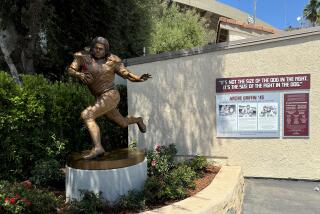Heisman Trophy Hype Can Be a Problem for Players and Coaches
- Share via
CHICAGO — At the beginning of the 1985 college football season, the Big Ten had two legitimate Heisman Trophy contenders.
The buildup for Iowa quarterback Chuck Long and Ohio State tailback Keith Byars actually began last season when both had outstanding junior campaigns.
Barring a late season reversal, both are likely to lose out in the Heisman balloting to Auburn’s Bo Jackson.
Their coaches, Iowa’s Hayden Fry and Ohio State’s Earle Bruce, can live with that.
But they say they see a disturbing trend they see toward extra hype for Heisman contenders and blame the media.
“The news media has taken this thing totally out of proportion,” Fry said. “It’s a shame. It’s getting worse every year.”
Bruce likens the Heisman hoopla to a political contest.
“It’s like politics in that you read stuff every day, there’s such a buildup by the news media that it gets out of hand,” Bruce said.
Fry has seen Long, who has had another banner season for the Hawkeyes, put under a microscope that even professional athletes seldom experience.
“It’s an everyday thing. If he makes one mistake, they say, ‘You are a Heisman Trophy candidate. You shouldn’t be letting us down,’ ” Fry said. “That’s totally wrong. College athletics isn’t supposed to be that way.”
Fry insists it isn’t sour grapes. He also credits his quarterback for withstanding media scrutiny and not allowing it to affect his performance on the field.
“What the media has to remember is that Chuck Long gets a scholarship. He doesn’t get one thing extra for handling all of these interviews and all of this stuff surrounding the Heisman,” Fry said. “In addition to everything else, he has to keep up with his studies and find time to practice and get ready for each game.”
Because Byars suffered a foot injury at the start of the season, he might not have had to deal with the constant interviews that Long did this year. But Bruce said the attention paid to medical reports and whether Byars would practice every day might have had a distracting influence on his team.
“What do I think can change things? Well, if the media wouldn’t make it so important and focus in on these guys that would help,” Bruce said. “Do I think that’s going to happen? No.”
At one time, the Heisman Trophy winner received his attention only at the end of the season. But with the rise of college football’s popularity and the explosion in the number of games that are nationally televised, the media wanted to focus on personalities.
“I can understand part of it because they want to report on the players who are supposed to be the tops in the country,” said Long, who bypassed a chance to turn pro last summer to stay at Iowa. “It’s flattering. But it’s a little ovewhelming.”
It isn’t that Fry and Bruce wouldn’t want to see their players win college football’s highest individual honor. There are recruiting benefits along with attention for the program.
“But this is a team sport and the focus on the individual isn’t what we are striving for,” Fry said.
Neither school’s publicity department ignored the Heisman voters. Both sent out ample amounts of literature on their stars before the season began. But both schools deny joining in overhyping once the season began.
“We sent out information but didn’t do it on a daily basis like some of the schools,” said Steve Shapp, the assistant sports information director for the Buckeyes.
Fry said, “We had special things for Chuck, Ronnie Harmon and Larry Station at the beginning of the summer. That’s OK. But to overdo it and deluge everyone with things isn’t the right way.”
More to Read
Go beyond the scoreboard
Get the latest on L.A.'s teams in the daily Sports Report newsletter.
You may occasionally receive promotional content from the Los Angeles Times.










